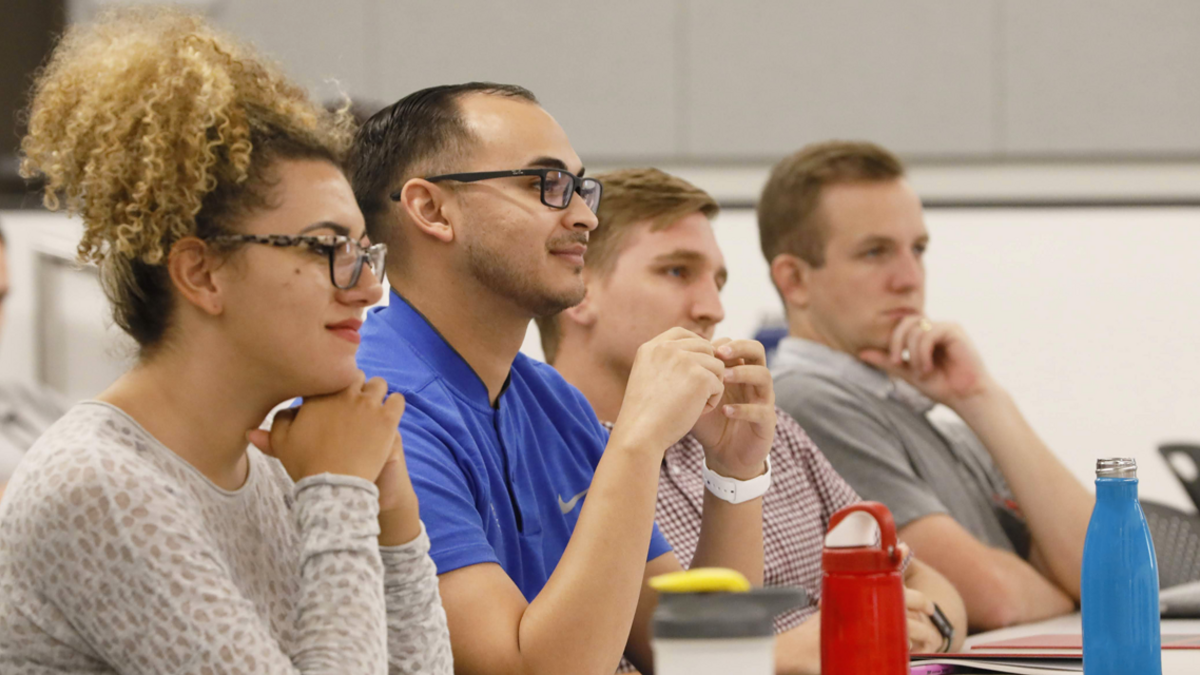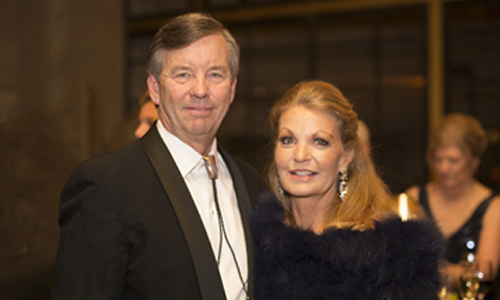ASU Law receives gift to create Public Interest Fellowships to help create justice reform

Jada Allender (at left), a current 3L student at ASU Law and executive director of outreach for the John P. Morris Black Law Students Association, is gratified to see this initiative launched.
Current events have brought discussion of the need for social, cultural and structural changes, including social justice reform, to the forefront. Institutions such as the Sandra Day O’Connor College of Law at Arizona State University are powerful agents for change in our society, and Dean Douglas Sylvester has committed to being part of that change.
In multiple statements released by Dean Sylvester in June, he addressed the concerns of students to confirm that ASU Law would stand in solidarity with those who are calling for racial justice, and that it would fulfill the promise of providing additional opportunities for students who want to participate in justice reform.
“As a law school, we have a special obligation to foster experiential opportunities to support and participate in our community,” Sylvester said. “We have engaged in dialogue with students about how to best support them in the work they are called to and want to do. We are proud of our students for leading this charge, and we stand ready to work alongside to educate, innovate and reform.”
To help be the catalyst for change, longtime Valley philanthropists Alison Lewis and Craig Krumwiede stepped up with a gift of $25,000, to be focused on tangible transformation. Their gift spurred the development of the Public Interest Fellowship, the first of its kind at the law school. The fellowship provides students with opportunities to work in nonprofit organizations that specifically focus on social justice reform.
Lewis and Krumwiede are strong advocates for the difference that well-stewarded philanthropy can make in a community, having supported numerous charities and nonprofits throughout their lifetime. But this gift carries special meaning, as both are alumni of ASU Law; Lewis graduated in 1981 and practiced law locally for many years; Krumwiede graduated in 1980 and is the president of Harvard Investments, Inc.

ASU Law alumni Craig Krumwiede '80 and Alison Lewis '81, helped launch the Public Interest Fellowship, a first of its kind at the law school, with a $25,000 gift. Photo by Jillian Rivera Photography.
“In light of all the protests and unfolding of current events, Craig and I felt strongly that we wanted to do something that would move the needle on social justice reform, that could be put in effect quickly and smartly and could really make a difference. It was important to us that it be at a local level here in the Valley,” Lewis said. “We believe educational opportunity is critical and we love the ASU model of inclusivity, so approaching ASU Law, where we are both graduates, seemed like the best avenue to achieve our goal. We know Dean Sylvester can make things happen and the Development Office worked with us to brainstorm possibilities. We know the Public Interest Fellowship can have an immediate and lasting positive impact on social justice reform and are delighted to help put it in motion.”
Krumwiede added, “So many enter the field of law with the intent to change and strengthen our democracy. This fellowship will help support that bright light. In addition, John P. Morris was my mentor when I was in law school, so this is a wonderful ‘pay it forward’ opportunity for me.”
In fact, these fellowships were established in direct response to a request from the John P. Morris Black Law Students Association (BLSA), one of nearly 50 student organizations at ASU Law, for the law school to provide more opportunities for engagement and access to social justice work.
Jada Allender, a current 3L student at ASU Law and executive director of outreach for the BLSA, is gratified to see this initiative launched as it serves as a vehicle to help diverse students pursue a career in public-interest work.
“Since BLSA has many members who are passionate about giving back to the community and working in the public-interest space, we are so happy to see this fellowship initiative take hold,” Allender said. “Many students pursue public-interest job opportunities but have to turn those offers down and accept a different position simply because the other position is paid. These fellowships will allow our students to chase their dreams in any legal field without stressing over their personal financial situation.”
Allender also has several ideas on how the program can ultimately help develop a more inclusive pipeline of attorneys into the field. ASU Law has focused on increasing its pipeline of talented and diverse students. Two years ago, 20% of the entering fall 2018 JD class identified as students of color (of the students that disclosed their ethnicity). This fall, ASU Law is on track to enroll its most diverse JD class in the past fifteen years at over 30% students of color.
However, that increase does not parallel the realities of the legal field. According to the past five years of predictive modeling data gathered by ALM as of November 2019, diversity in large firm equity partnerships will not mirror law school diversity until 2084.
“The legal community currently has a marked shortage of both (racially) diverse attorneys and diverse law students. There needs to be a stronger pipeline for diverse students to come to law school and for those students to enter the legal community,” Allender said. “This includes more purposeful scholarship and recruiting efforts, curriculum that better addresses how race impacts each area of the law, more diverse staff and faculty, and intentional employer outreach and engagement.”
Allender is appreciative of the financial support from the community, especially to the program’s initial donors, Lewis and Krumwiede.
“Funding this fellowship program can make or break a student's ability to follow his or her passion and desire to work in the public-interest space,” Allender said. “Since most public-interest internships, externships and clerkships are unpaid, many students are not in a position to accept such positions. Without this fellowship, many students — particularly diverse students — are unable to take amazing summer employment opportunities in the public-interest space because working full time without being paid is just not a viable financial option.”
The fellowship has also attracted the attention of local law firms and a few have inquired about supporting this initiative with stipends given to students selected to participate. The outpouring of support from the legal community and local law firms has energized Allender and the impact it will have on her fellow law students.
“I am so proud to see firms in our community stepping up to support law students,” Allender said. “As someone who is interested in big law and will be working in a firm, it is important to me to see firms commit to giving back to the community and helping law students succeed.”
Sylvester encourages other law firms and social justice reform advocates in the legal community to join ASU Law by supporting this initiative.
“On behalf of the Sandra Day O’Connor College of Law, we are thankful for the generosity of the donors who helped establish these fellowships,” Sylvester said. “Your investment will ensure that our students make an impact beyond the walls of our classrooms.”
If you would like to make a gift to help endow the Public Interest Fellowship, visit the ASU Foundation site or contact Terri Burkel, senior director of development at ASU Law, at 480-965-5329 or via email at Terri.Burkel@asu.edu.
More Law, journalism and politics
Can elections results be counted quickly yet reliably?
Election results that are released as quickly as the public demands but are reliable enough to earn wide acceptance may not…
Spring break trip to Hawaiʻi provides insight into Indigenous law
A group of Arizona State University law students spent a week in Hawaiʻi for spring break. And while they did take in some of the…

LA journalists and officials gather to connect and salute fire coverage
Recognition of Los Angeles-area media coverage of the region’s January wildfires was the primary message as hundreds gathered at…

